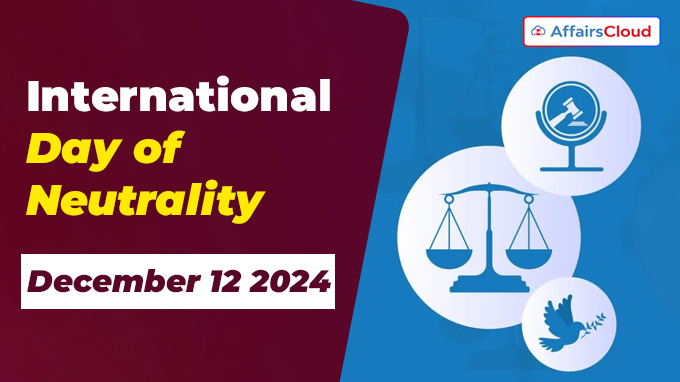
The United Nations (UN)’s International Day of Neutrality (IDN) is annually observed across the globe on 12th December to raise awareness about the value of neutrality in relations between countries and to promote global peace and security.
Note: Article 2 of the UN Charter requires member states to resolve international conflicts peacefully and avoid threatening or using force.
Background:
i.On 2nd February 2017, the United Nations General Assembly (UNGA) adopted the resolution A/RES/71/275, proposed by Turkmenistan, declaring 12th December of every year as the IDN.
ii.Since 12th December 1995, the UN has acknowledged Turkmenistan as a permanently neutral state.
iii.The resolution highlights the relationship between maintaining peace and achieving the 2030 Agenda for Sustainable Development Goals (SDG).
iv.The first-ever IDN was observed on 12th December 2017.
What is Neutrality?
i.Neutrality is the legal status that occurs when a state chooses not to take part in any war between other countries.Staying neutral and unbiased towards the warring parties, with both sides recognizing this neutrality, is essential for the United Nations to earn and maintain trust.
ii.Switzerland is well-known for its neutrality.India has maintained a neutral stance in global politics.During the Cold War, India avoided aligning with either the United States(US) or the Soviet Union.
Preventive diplomacy:
i.UN is focused on transforming its strategy from ‘reaction’ to ‘prevention.’
ii.Preventive diplomacy involves using diplomatic efforts to stop disputes from turning into conflicts and to contain conflicts if they arise.
iii.The concept of preventive diplomacy has fascinated the United Nations since Secretary-General Dag Hammarskjöld introduced it almost fifty years ago.
iv.Article 99 of the United Nations Charter laid the groundwork for preventive diplomacy by allowing the Secretary-General to warn the Security Council about threats to peace and security.
Mediation:
i.Since its creation, the UN has been key in mediating conflicts between and within countries at every stage: before they turn into wars after violence begins.
ii.The Department of Political Affairs (DPA) was created in 1992 to support these efforts, and in 2019, it teamed up with the Peacebuilding Support Office (PBSO) to form the new Department of Political and Peacebuilding Affairs (DPPA).
Peacemaking:
i.UN remains a key player in peace efforts, working more closely with regional organizations to resolve ongoing conflicts and prevent new crises from starting or getting worse
ii.The DPPA leads the UN’s peace efforts by keeping track of global political events and advising the Secretary-General on preventing and handling crises.
About the United Nations:
Secretary general– António Guterres
Establishment – 1945
Headquarters – New York, The United States of America




